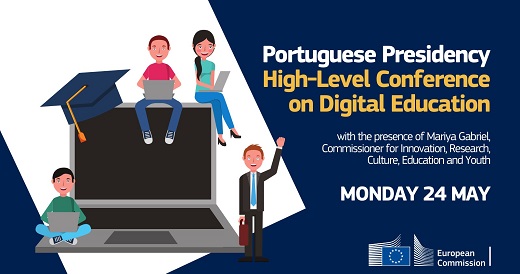
As part of the framework of the Portuguese Presidency of the Council of the European Union, the Portuguese Ministry of Education organised a High-Level Event on Digital Education in May. At the event, speakers discussed some of the dimensions of the Digital Education Action Plan (2021-2027), as well as, the impact of the contribution of education and training to improve the digital transition.
The High-Level Event aimed to address how we can use digital education to engage, to care and to foster. When discussing how digital education could be used to engage many considered engagement as using digital education as a component of innovative education and training systems. Many participants also presented digital education through a caring lens when used as a driving force for inclusion, equity, and success for all. Finally, when discussing how digital education could be used to foster, there was consensus that digital education could be used as a step forward in shaping citizenship rights through lifelong learning.
The majority of educators agree that technology is a valuable support for teaching and learning processes. It is also clear there is a need for citizens to have the digital skills necessary for life in a modern world which requires ever increasing digital competency. At a fundamental level Digital Education can be used as a component of innovative education and training systems; and as a means of meaningfully engaging learners in their education and training. But it is critical too not to get caught up in the bells and whistles that technology can afford us. Engagement is more than entertainment.
In terms of digital education being exploited, to care, we can look at how Digital education can be a driving force for inclusion, equity and success for all. In 2020 the LEAD-ME COST Action was officially launched. Both myself and Dr Tríona Hourigan are Management Committee members of the Action. LEAD-ME aims to help European stakeholders in the field of Media Accessibility to meet legal milestones requested by the 2019 European legislation. One of the work packages in this Action looks at how we can develop guidelines and curricula for teaching and training media accessibility; this has the potential to revolutionise how digital materials are designed to maximise inclusivity and digital practices in the classroom. In order to comply with the European legislation, public sector organisations and private companies and organisations need to check the accessibility of their websites, mobile apps, and media content. The publishing sector must also adhere to these common accessibility standards ensuring that digital content can be used by all. High quality digital materials need to be designed and developed and this requires professional time and resources. We cannot expect this to happen without cost. We need the government to commit to supporting open education with a clear strategy [1, 2].
If we look at how Digital Education can be used to foster we can see Digital Education as a step forward in shaping citizenship rights through lifelong learning and micro credentials. Open Educational Resources (OERs), the term coined for digital learning resources at UNESCO's 2002 Forum on Open Courseware, have the potential to offer an equitable education to many. However, now in 2021 and almost two decades later, OERs have not been exploited to their full potential in many countries. This lack of uptake could be attributed to a lack of policy by education departments. Policy is critical if open education is to be realistically supported and promoted [3]. During 2020 and 2021 as the COVID-19 pandemic forced the physical closure of schools all over the world many stakeholders in education, including teachers and private companies, supported emergency remote teaching and learning online through sharing their recommendations and opening access to their resources. In Ireland Open Education is beginning to feature more prominently in the online spaces where stakeholders access digital resources for teaching and learning. For example, the digital repository Scoilnet has compiled a list to highlight the Open access resources available and also requested that teachers make recommendations and upload such resources to the Scoilnet portal.
The pandemic has brought us to a place where we can now critically look and try to understand the impact of technology in education on student progression and learning outcomes [4]. At both national and international levels Open Education can contribute directly to key system objectives by improving the quality of the learning environment. Open Education can also support international and national priority around student progression.
It is clear that there is a long way to go before every classroom sees students availing of the technology to transform their learning. We must encourage an evolving personalized digital learning environment in which all stakeholders including policy makers, administrators, teachers and students collaborate to create a future of renegotiated core competencies but this is unlikely to happen without a national policy advocating for the use of open educational resources. Open Education must be supported by governments in a more visible manner and Open must be promoted at the stage of Initial Teacher Education. In conclusion, we need to make sure that when it comes to Digital Education everybody is involved; parents, students, teachers and all other stakeholders, promoting learning across Digital Education.
Our new book, the Springer Handbook for Online Learning Contexts: Digital, Mobile and Open is available now from: this link
[1] Hodgkinson-Williams, C., & Arinto, P. (2017). Adoption and impact of OER in the Global South (p. 610). African Minds.
[2] Schuwer, R., Kreijns, K., & Vermeulen, M. (2014). Wikiwijs: An unexpected journey and the lessons learned towards OER. Open Praxis, 6(2), 91-102.
[3] Marcus-Quinn, A., & Hourigan, T. (2017). The potential of OERs for K-12 schools: why policy is crucial to success. In Handbook on digital learning for k-12 schools (pp. 455-464). Springer, Cham.
[4] Marcus-Quinn, A., & Hourigan, T. eds, (2021). Handbook for Online Learning Contexts: Digital, Mobile and Open: Policy and Practice. Springer, Cham.


